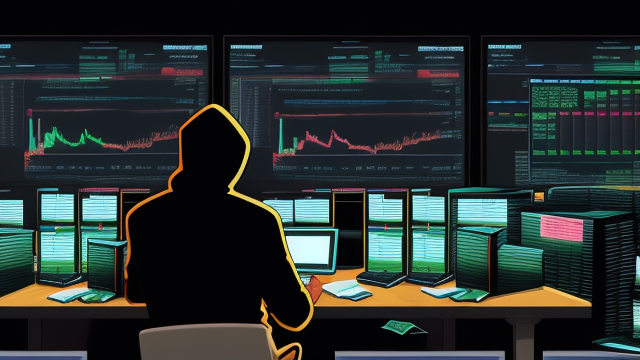How to Avoid Bitcoin Scams and Frauds in Ghana

Cryptocurrencies, especially Bitcoin, have gained significant popularity in recent years. However, with the rise in demand and interest, there has also been a surge in Bitcoin scams and frauds. Ghana, like many other countries, has witnessed cases of unsuspecting individuals falling victim to these scams. In this article, we will explore the various types of Bitcoin scams and frauds, identify red flags to watch out for, and provide practical tips on how to avoid becoming a victim.
Introduction
The digital nature of Bitcoin makes it an attractive target for scammers and fraudsters. They exploit the decentralized and pseudonymous nature of cryptocurrencies to deceive individuals and steal their hard-earned money. Understanding the different types of scams and recognizing warning signs can help you safeguard yourself from falling prey to these fraudulent activities.
Understanding Bitcoin Scams and Frauds
Bitcoin scams and frauds encompass a wide range of deceptive practices. These schemes are designed to trick individuals into sending their Bitcoin or personal information to scammers. Let’s explore some common types of scams encountered in Ghana.
Phishing Scams
Phishing scams involve fraudsters creating fake websites or emails that mimic legitimate platforms to trick users into providing their sensitive information. In the context of Bitcoin, scammers may send emails claiming to be from a reputable exchange or wallet provider, asking users to log in and revealing their login credentials.
Ponzi Schemes
Ponzi schemes promise high returns on investment but rely on funds from new investors to pay existing participants. These schemes eventually collapse when there are not enough new investors, leading to significant financial losses for those involved.
Fake Exchanges and Wallets
Scammers create fraudulent exchanges and wallets that appear genuine but are designed to steal your Bitcoin or personal information. Unsuspecting users may deposit their funds, only to realize that the platform is fraudulent and their assets are irretrievable.
Pyramid Schemes
Similar to Ponzi schemes, pyramid schemes rely on recruiting new members to pay out existing participants. Participants are promised substantial rewards for recruiting others, but the scheme inevitably collapses when recruitment slows down.
Red Flags to Look Out for
Recognizing red flags can help you identify potential Bitcoin scams and frauds. Here are some warning signs to be cautious of:
Unrealistic Promises
If an investment opportunity promises extremely high returns with little to no risk, it is likely too good to be true. Exercise caution when encountering such offers and conduct thorough research before investing your funds.
Lack of Regulation and Transparency
Legitimate exchanges and investment platforms comply with regulations and provide transparency regarding their operations. If an opportunity lacks regulation or fails to disclose essential information, it may be a sign of a scam.
Pressure Tactics and Urgency
Scammers often employ pressure tactics to create a sense of urgency and manipulate individuals into making hasty decisions. They may use tactics like limited-time offers or fear of missing out (FOMO) to pressure you into sending Bitcoin or personal information without conducting proper due diligence.

Tips to Avoid Bitcoin Scams and Frauds
While Bitcoin scams and frauds can be sophisticated, there are several steps you can take to protect yourself and minimize the risk of falling victim to these deceptive schemes.
Research and Due Diligence
Before investing in any Bitcoin-related opportunity, conduct thorough research. Verify the legitimacy of the company or individual promoting the investment, read reviews, and check if they are registered with the appropriate regulatory authorities. Understanding the risks and potential rewards is essential before committing your funds.
Use Secure Wallets and Exchanges
To safeguard your Bitcoin, use reputable and secure wallets and exchanges. Choose platforms that have a strong track record, robust security measures, and a transparent operating process. Research and compare different options to find the most reliable and trusted providers.
Be Wary of Unsolicited Offers
Be cautious when receiving unsolicited offers via email, social media, or phone calls. Scammers often reach out to potential victims with enticing offers that sound too good to pass up. Avoid engaging with unknown individuals or companies unless you have independently verified their credibility.
Verify the Legitimacy of Companies and Individuals
Before engaging with a Bitcoin-related service or investment opportunity, verify the legitimacy of the company or individual involved. Check their credentials, licenses, and professional affiliations. Reach out to trusted sources for recommendations and testimonials.
Educate Yourself about Scam Techniques
Stay informed about the latest scam techniques used in the cryptocurrency space. Familiarize yourself with common red flags, such as promises of guaranteed returns, pyramid-like structures, or requests for personal information. By being aware of these tactics, you can better protect yourself from falling victim to scams.
Trust Your Instincts
If something feels off or too good to be true, trust your instincts. Scammers often rely on emotional manipulation to exploit individuals. If a Bitcoin-related opportunity raises suspicions or triggers your intuition, it’s best to err on the side of caution and refrain from participating.
Reporting Scams and Seeking Legal Assistance
If you have fallen victim to a Bitcoin scam or fraud, it’s crucial to take action promptly. Report the incident to the appropriate authorities, such as the local police or the cybercrime unit. Additionally, consult with legal professionals who specialize in cryptocurrency fraud to explore potential legal remedies and recovery options.
Conclusion
As the popularity of Bitcoin continues to grow, so does the risk of scams and frauds. By understanding the various types of scams, recognizing warning signs, and following the provided tips, you can significantly reduce the likelihood of becoming a victim. Stay vigilant, conduct thorough research, and trust your instincts when navigating the cryptocurrency landscape in Ghana or anywhere else.
FAQs
A1. No, Bitcoin is a legitimate decentralized digital currency. However, scammers often use Bitcoin as a means to deceive and defraud unsuspecting individuals.
A2. Recovering funds lost to Bitcoin scams can be challenging, but it’s important to report the incident to the authorities and seek legal assistance. In some cases, recovery may be possible through legal means.
A3. Not all exchanges and wallets are safe. It’s crucial to choose reputable and secure platforms with a proven track record of security measures and transparency.
A4. Stay informed by following reputable cryptocurrency news sources, joining online communities, and participating in discussions about Bitcoin and cryptocurrency. These platforms often share information about the latest scams, warning signs to look out for, and tips to protect yourself.
A5. Investment opportunities that promise unrealistically high returns with little to no risk should raise red flags. Always remember the principle that if it sounds too good to be true, it probably is. Conduct thorough research, seek professional advice, and make informed decisions before investing your hard-earned money.
You may like How to Convert BTC to Cedis in Ghana